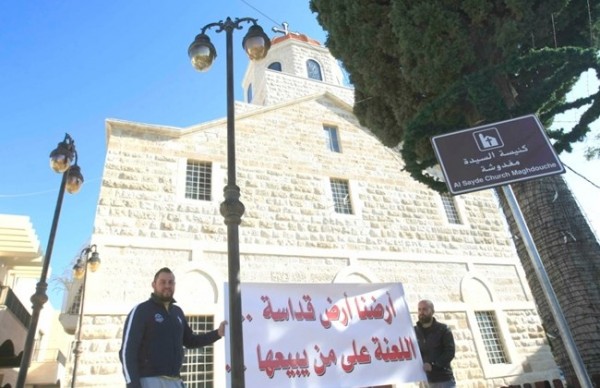
Residents of a mostly-Christian town in south Lebanon Thursday protested the selling of property to non-Christians over fear of demographic changes.
“Don’t sell gold to buy cheap scrap metal,” “Our land is sacred, damn those who sell it,” and “Those who sold their land should leave,” read banners held up by residents of Maghdoushe, a suburb east of the southern coastal city of Sidon, as they stood outside the town’s main church.
The protest is only one of a series of similar protests held in the past, in opposition to the selling of the land to non-Christians and Lebanese from areas outside of Sidon and its suburbs.
No official consensus on Lebanon’s demographics has been taken since 1932.
“Our protest is neither sectarian nor political, but is against Maghdoushe residents themselves who are selling their land and their properties,” said Fadi Safi, one of the organizers of the protest.
He said the protests had begun in 2011 after large chunks of land, especially on the outskirts of the town, were sold to people from outside the area “.
Safi said studies were carried out to see which pieces of land were sold and why, saying the number was high and for reasons he and other residents did not know.
He added that a series of lectures were carried out “to raise awareness on the importance of protecting the land and only selling it to someone in the town if they really had to.”
“We told people they can cultivate their land and benefit from it, so it becomes a source of income… This way we won’t lose Maghdoushe, geographically and demographically,” Safi added.
He said the municipality presented a report to the head of the Urban Planning Department to classify Maghdoushe’s land as “under study,” meaning the municipality would have the authority to prevent or delay the selling of any piece of land.
“Those holding onto their land are more in need (of money) than those selling, as those who aren’t selling are finding alternatives,” added Safi, stating the church was in full support of the protest, which will soon expand to cover the rest of eastern Sidon and the Mount Lebanon Chouf town of Deir al-Qamar, a Christian town.
Many Shiite businessmen, allegedly acting on behalf of Hezbollah, a party that has in effect controlled the country since 2006, have been buying up swathes of land, many of which are in Christian areas and outside the traditional Shiite enclaves. Alarmed Christians see the acquisitions as part of Hezbollah’s long-term plan to consolidate its grip on the country.
The Shiite purchase of Christian land in Lebanon drove former Lebanese Labor Minister Botros Harb in 2011 to submit to the cabinet a draft law that prohibits the sale of land across religions.
Harb’s proposal mirrored Lebanese fears of a scheme that enables Hezbollah’s backer Iran of exercising growing economic influence in Lebanon through Shiite businessmen who buy lands and houses owned by Christians and take advantage of Lebanon’s free market economy.
The draft law, of which AlArabiya TV obtained a copy, consists of six articles and an explanation of the way in which they are not in violation of the Lebanese constitution.
The first article of the law stipulates that sale of property should only be among members of the same religion for the coming 15 years and that any contracts that violate this law should be annulled. This includes what the law describes as “fake contracts” where the purchasing party is not the real beneficiary of the deal.
According to the draft, those who violate this law whether by sale, purchase, or mediation will face five to 10 years in jail and fined double the price of the sold property.
The law reportedly was never ratified

Leave a Reply
You must be logged in to post a comment.